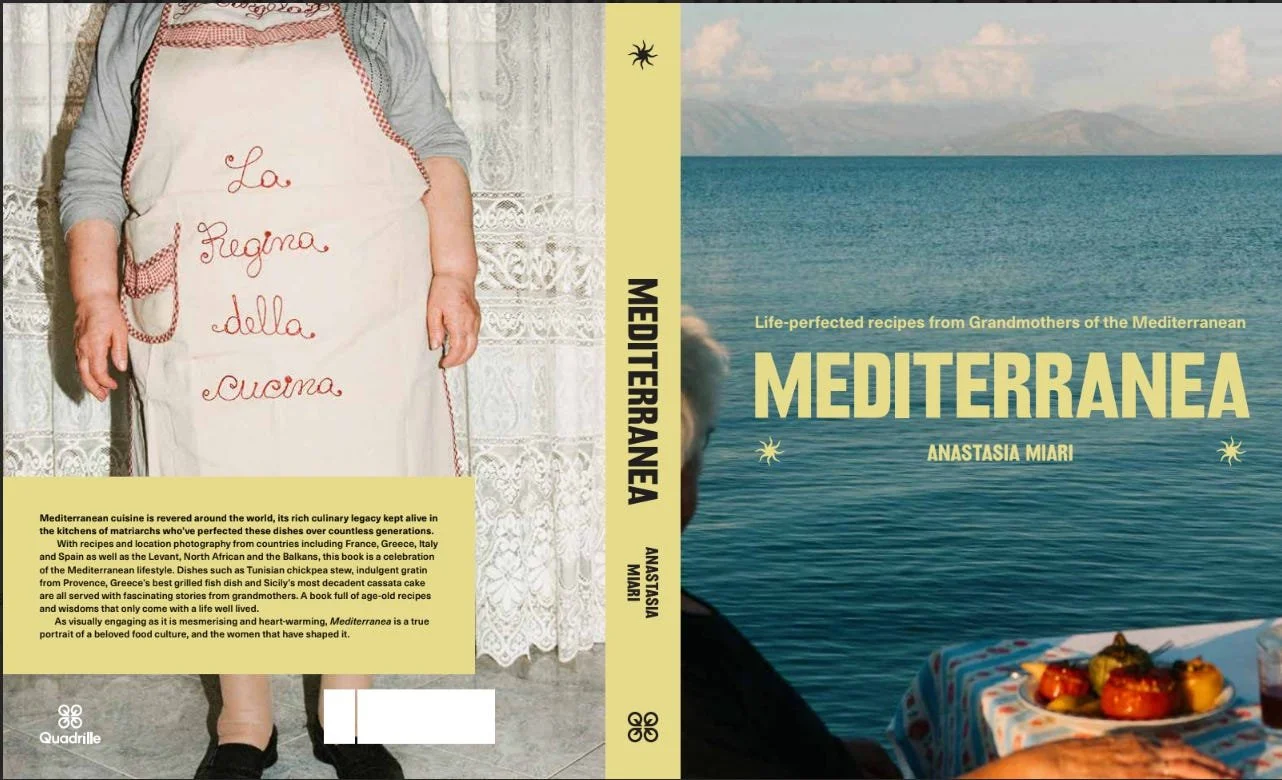Why Grandmother Wisdom Matters More Than Ever
In the kitchens of the Mediterranean, there’s a particular kind of silence that speaks volumes. It’s not quiet, it’s rich with simmering, stirring, and memory. There’s no Alexa reading out instructions, no printed recipe stuck to the fridge. Just a grandmother, her hands dusted in flour, her gestures fluid from decades of repetition. This is how recipes live in the Mediterranean, not in books, but in bodies. In motion. In memory.
And yet, what happens when those memories begin to fade?
That question pulses beneath every page of Mediterranea: Life-Perfected Recipes from Grandmothers of the Mediterranean (Quadrille, out 31 July), the luminous new cookbook by writer Anastasia Miari. But this isn’t just a collection of meals, it’s an archive of matriarchal knowledge, a love letter to the kitchens that shaped a region, and a quiet act of cultural preservation.
Miari travels across the Mediterranean basin, Sicily, Crete, Turkey, the Côte d'Azur, coastal Croatia seeking out the women who’ve carried their families' recipes for generations. These grandmothers aren’t celebrity chefs. They don’t have food blogs or cooking shows. What they have is something rarer: inherited wisdom, layered through repetition, intuition, and care. And Miari treats their stories with reverence.
Each dish in Mediterranea, from saffron-stained rice to yogurt-drenched vegetables, is embedded in personal memory. But together, these recipes become more than the sum of their parts. They become a map of the Mediterranean, one drawn not by borders, but by shared values: simplicity, seasonality, frugality without sacrifice. This is food that belongs to no single nation, yet speaks fluently across them all.
Mediterranea by Anastasia Miari, photographed by Marco Argüello and published by Quadrille.
Why Grandmothers Matter Now
In our increasingly digitised lives, we risk losing the very thing that has always grounded Mediterranean identity: the oral passing-down of knowledge. As screens replace kitchen tables and algorithms shape how we cook, something deeply human is being forgotten.
Grandmothers, across the Mediterranean and beyond, have long been the bearers of living culture. Their recipes are not just instructions, they’re stories. They reflect scarcity and abundance, celebration and survival. They carry the fingerprints of migration, war, joy, exile, harvest. And most importantly, they’re cooked not for performance, but for love.
In this way, Mediterranea is not nostalgic. It’s urgent. These are recipes that, without documentation, risk vanishing within a generation. The book becomes a bridge, ensuring that the food memory of a region is not lost to time
to trends, or to the flickering pace of social media cooking culture. It is, in essence, an act of resistance, a gentle but powerful reminder that heritage is not static, but it must be held, repeated, and passed on by hand.
These grandmothers—whether kneading dough under an olive tree in Lesbos or stirring lentils in a clay pot on the Anatolian plateau—are archivists. Not of texts or documents, but of flavour, intuition, and belonging. They cook with memories, with seasons, with what’s available and what’s sacred. In their kitchens, the Mediterranean is not a fantasy. It is real, rooted, alive.
Mediterranea by Anastasia Miari, photographed by Marco Argüello and published by Quadrille.
The Common Thread
What makes Mediterranea so resonant is how it weaves the disparate corners of the Mediterranean into one long table. The languages may differ, the ingredients shift slightly from one coast to another, but the values echo.
There is a shared sense of resourcefulness: bread is never wasted, vegetables are stuffed, broth is stretched. There is reverence for the land: wild herbs are foraged, fish bought from neighbours, lemons grown in courtyards. And above all, there is a profound respect for slowness, not just in the cooking, but in the sharing. Meals are long, and they are rarely eaten alone.
From Sicilian pasta to Turkish salads, the act of preparing food, of touching, tasting, waiting is what binds the Mediterranean together. In Miari’s words and in her subjects’ kitchens, we see how the region’s food culture isn’t just delicious. It’s deeply philosophical.
Miari celebrates the diverse and vibrant dishes of the Med and the stories of the grandmothers who have perfected these age-old recipes in this wonderfully evocative cookbook.
A Cookbook That Lives Like a Diary
Visually, the book is luminous. Photographer Marco Argüello captures the glow of kitchens warmed by afternoon light, the texture of aprons faded from use, the smile lines on the faces of the women whose food built families. Every image feels like it belongs in a travel journal or the kind of family album you never throw away.
Miari’s writing is similarly unforced. It has the rhythm of someone who has sat and listened more than she has spoken who knows that storytelling is a form of respect. She is never the centre of the frame, but the conduit through which these women speak.
For Our Readers
At The Mediterranean Magazine, we often speak of lifestyle, but really, we mean lifeways. The way a grandmother pulls a roast from the oven, wraps leftovers in cotton, stirs with the same spoon her mother once used, that is culture in motion. It is not curated for clicks. It is alive.
Mediterranea belongs on the shelf of anyone who has felt the warmth of olive oil on their fingers and remembered a time, a person, a place. It’s for those who know that to cook is to remember, and to eat is to honour what came before.
And perhaps, most importantly, it’s for those who still believe there is wisdom worth slowing down for. Wisdom folded into pastry. Wisdom simmering on the back burner. Wisdom whispered, quietly, from one generation to the next.


